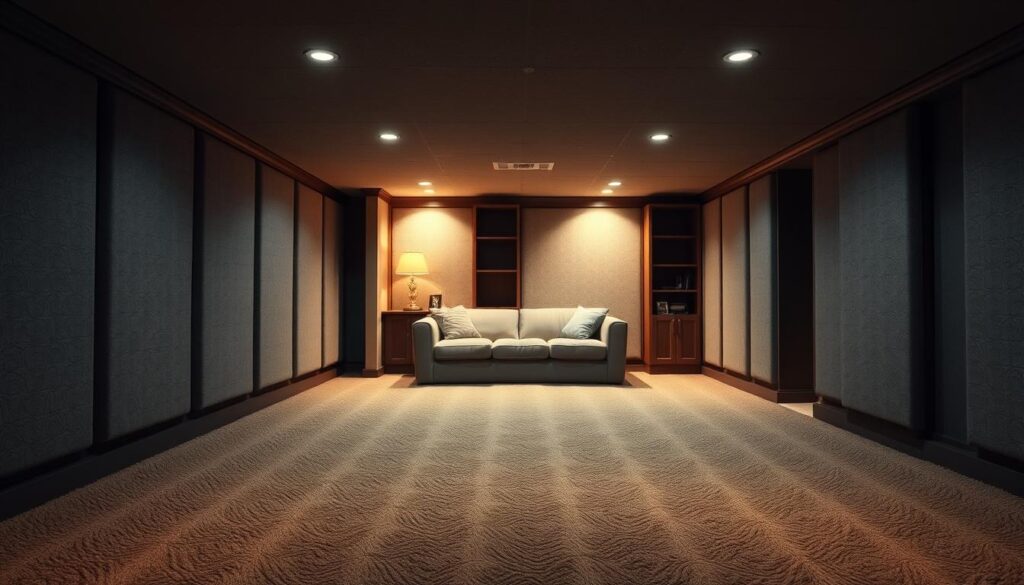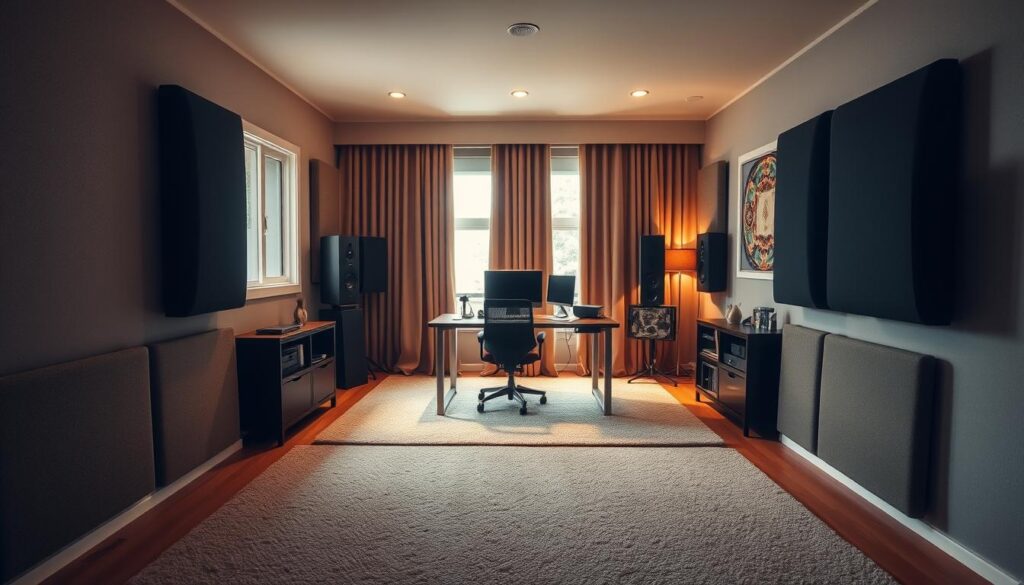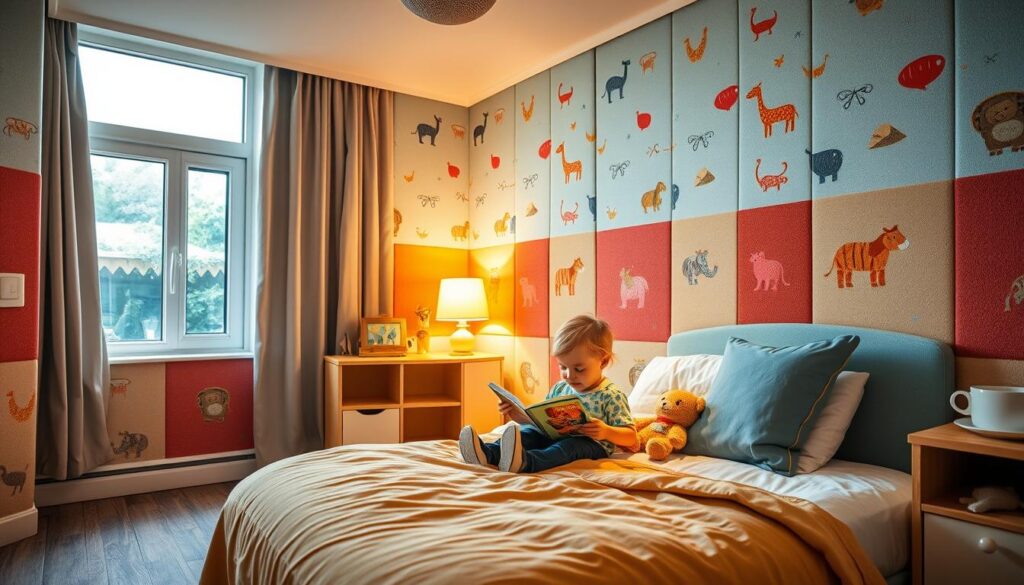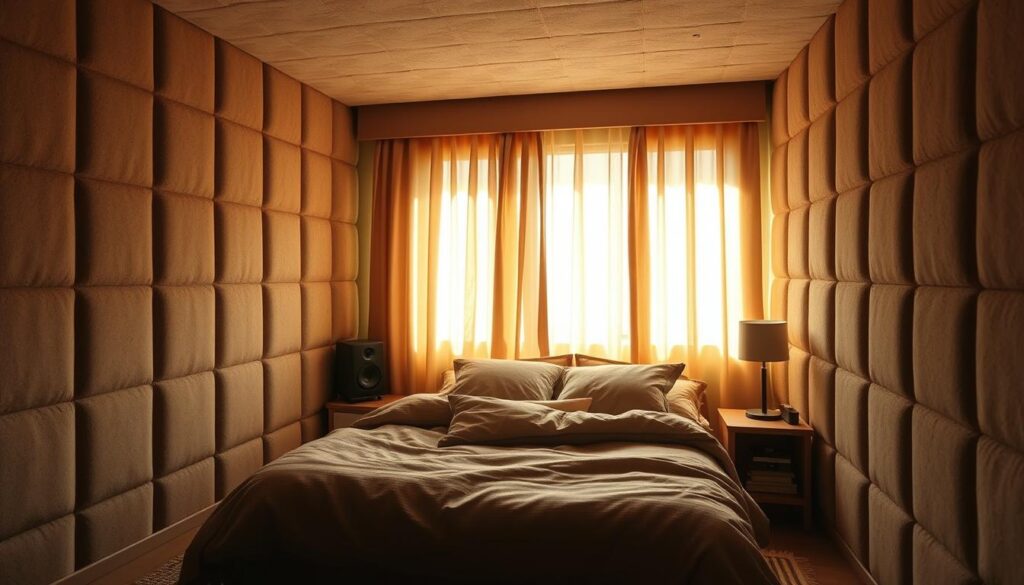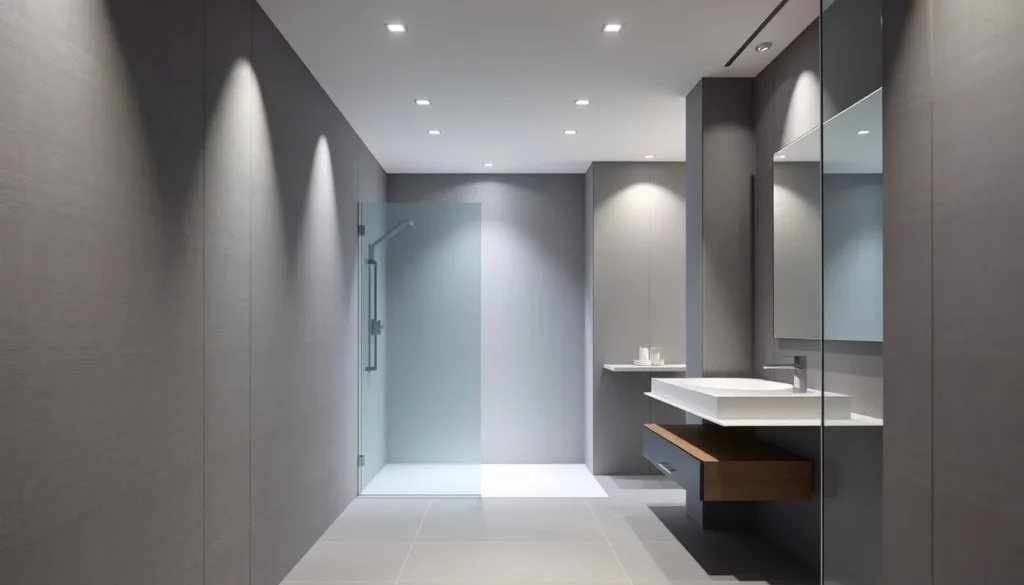Turning your basement or cellar into a peaceful spot can really improve your life. Fixing moisture issues and using basement soundproofing tricks can make it comfy for chilling, watching movies, or working.
Did you know basement soundproofing can also up your home’s value and help you sleep better? Soundproofing your cellar can turn it into a cool home theater, music room, or guest room. It’s all about controlling sound and moisture to create a calm and useful space.
Understanding the Need for Soundproofing
A quiet basement is key to a peaceful home. Soundproofing helps make your basement a serene space. It’s about creating a more comfortable and peaceful area.
Soundproofing does more than just reduce noise. It improves your life quality. A quiet basement is a peaceful escape from daily noise. Effective soundproofing can significantly reduce noise pollution, making your home more enjoyable.
Benefits of Soundproofing Your Basement
Soundproofing your basement has many benefits. It improves your mental health and focus by reducing noise. It also increases your home’s value, attracting buyers who want a quiet space.
- Enhanced mental health and reduced stress
- Improved focus and productivity
- Increased home value
- Better overall quality of life
Investing in soundproofing does more than just reduce noise. It makes your living space better for well-being and relaxation.
Common Noise Issues in Basements and Cellars
Basements and cellars face many noise problems. Airborne noise comes from sounds in the air, like voices or music. Impact noise is from footsteps or objects hitting the floor or walls. Knowing these types is key to soundproofing.
To fix these noise problems, find the sources and use the right soundproofing. This might include soundproof insulation or other strategies for your basement.
By controlling basement noise, you can make it a peaceful spot. It’s great for a home office, gym, or just a quiet place. Soundproofing is essential for these goals.
Types of Noise Interference
To soundproof your basement or cellar well, you need to know about different noise types. Noise can really disrupt your life and work. By figuring out where the noise comes from, you can fix it better.
Airborne vs. Impact Noise
Noise mainly comes in two kinds: airborne and impact. Airborne noise travels through the air, like voices and music. Impact noise happens when vibrations go through solid things, like footsteps.
Knowing the difference helps you pick the right soundproofing stuff. For airborne noise, use acoustic panels and foam. For impact noise, try decoupling or mass-loaded vinyl.
Identifying Noise Sources in Your Home
Finding out where the noise comes from is key. Look at what noises bother you most. Is it footsteps from upstairs or your HVAC system? Making a list helps you know what to do next.
| Noise Type | Examples | Soundproofing Solutions |
|---|---|---|
| Airborne Noise | Voices, Music, TV Sounds | Acoustic Panels, Soundproofing Foam |
| Impact Noise | Footsteps, Moving Furniture, Dropping Objects | Decoupling Techniques, Mass-Loaded Vinyl |
Understanding noise types and finding your home’s noise sources helps a lot. Whether it’s airborne or impact noise, there are DIY ways and materials to make your space quieter.
Effective Soundproofing Materials
To have a peaceful home, you need the right soundproofing materials. These materials help cut down on noise and make your space comfy. Knowing what soundproofing materials are out there helps you choose the best for your project.
Acoustic Panels
Acoustic panels soak up sound waves, cutting down on echo and reverberation. You can put them on walls, ceilings, or corners. They make your space quieter by absorbing sound waves.
Key Benefits of Acoustic Panels:
- Reduces echo and reverberation
- Improves overall sound quality
- Enhances the aesthetic appeal of your space
Soundproofing Foam
Soundproofing foam is great for cutting down noise in basements or cellars. It absorbs sound waves, stopping them from echoing. You can use it with other materials for even better results.
Soundproofing foam is super useful in noisy areas like home theaters or music rooms.
Mass Loaded Vinyl
Mass loaded vinyl is a thin, flexible sheet filled with heavy metal. It adds mass to walls, ceilings, or floors, blocking sound. AudioSeal Mass Loaded Vinyl Soundproofing Barrier is a favorite for its effectiveness and easy setup.
Adding these soundproofing materials to your basement or cellar can greatly reduce noise. Whether you want a better home theater or a quieter home, the right materials can help.
Insulation Options for Soundproofing
Insulation is key for soundproofing your basement. It cuts down on noise and boosts energy efficiency. You have several insulation types to pick from.
Two top picks are Spray Foam Insulation and Fiberglass Insulation. Let’s dive into each.
Spray Foam Insulation
Spray foam insulation is great for soundproofing. It fills gaps and cracks, stopping noise. It expands to seal spaces, making it perfect for odd-shaped areas or hard-to-reach spots.
Fiberglass Insulation
Fiberglass insulation is another good choice. It absorbs sound, lessening noise through walls and ceilings. It’s easy to install and fits many uses, like batts and blankets.
When picking insulation, think about soundproofing needs, budget, and your basement’s specifics.
Choosing the right insulation boosts your basement’s soundproofing. This makes your living space quieter and more peaceful.
Assessing Your Basement’s Soundproofing Needs
To soundproof your basement well, you need to know what it needs. First, check how your basement sounds now. Look for spots where sound leaks in or out.
Conducting a Sound Assessment
A good sound check is key to soundproofing. Here’s how to do it:
- Find out where the noise comes from, like creaky floors or loud appliances.
- See how sound moves, like through gaps in doors or windows.
- Know if the noise is airborne or impact noise.
This helps you plan how to soundproof your basement better.
Setting Your Acoustic Goals
After checking your basement, set clear sound goals. Think about what you want to achieve. Do you want to:
- Less echo and reverberation?
- Keep sound from spreading to other rooms?
- Make a top-notch home theater or recording studio?
With specific goals, you can pick the best soundproofing materials for cellars. You might use acoustic panels, soundproofing foam, or other materials for your needs.
By doing these steps, you’re on the right path to a DIY basement soundproofing solution. It will improve your living space.
DIY Soundproofing Techniques
You can make your home quieter by using DIY soundproofing methods. Soundproofing your basement or cellar is easier than you think. With the right tools and materials, you can make a quieter space that’s more comfortable.
Sealing Gaps and Cracks
Sealing gaps and cracks is a simple yet effective DIY soundproofing method. Acoustic caulk is a special sealant that blocks noise. By using acoustic caulk around windows, doors, and wall or floor gaps, you can block more noise.
- Look for gaps or cracks in your basement or cellar.
- Clean the area around the gaps for a better seal.
- Use a caulk gun to fill the gaps with acoustic caulk.
- Smooth out the caulk with a damp cloth or tool for a clean finish.
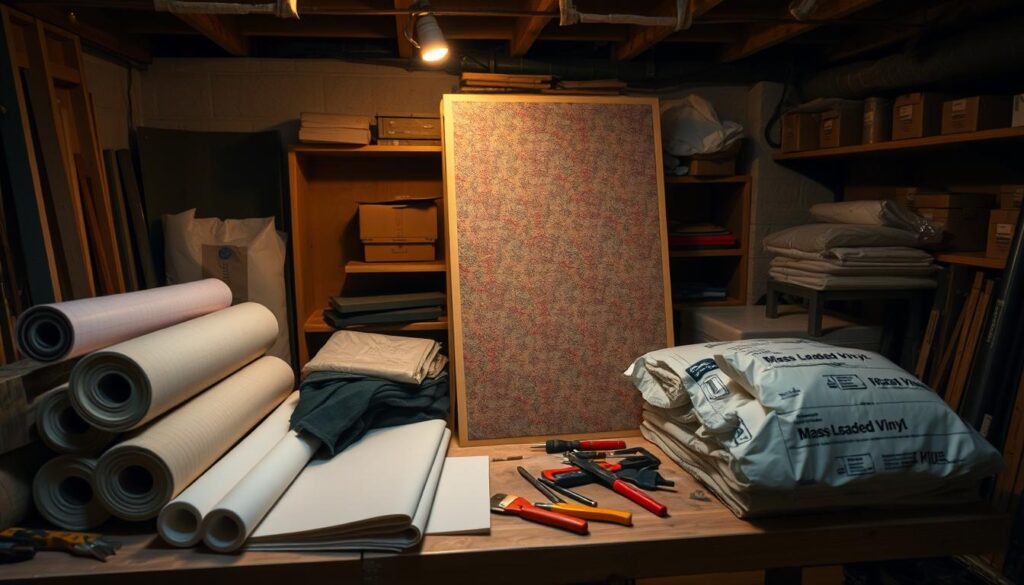
Using Rugs and Curtains
Using rugs and curtains is another good DIY soundproofing method. Thick, heavy rugs can cut down on footstep noise and other impact sounds. Heavy curtains or drapes can also absorb sound waves, making your space quieter.
| Soundproofing Element | Purpose | Benefits |
|---|---|---|
| Rugs | Absorb impact noise | Reduces footstep noise, easy to install |
| Heavy Curtains | Absorb airborne noise | Reduces echo and external noise, decorative |
| Acoustic Caulk | Seal gaps and cracks | Reduces noise leakage, easy to apply |
By using these DIY soundproofing techniques, you can make your basement or cellar quieter. Whether you want a home theater, a music room, or a quiet spot, these methods can help you achieve your goals.
Professional Soundproofing Services
DIY methods can fix small sound issues, but for bigger problems, you need pros. If you want a quieter basement, knowing when to call in experts is key.
When to Consider Hiring Experts
Experts are a must for tough noise problems that DIY can’t solve. They’re great for setting up a home theater, recording studio, or a quiet area in your basement.
Complex Noise Problems: Experts can handle complex noise issues well. They know how to tackle different noise sources.
Lack of Technical Knowledge: Without the right skills, you might not solve the problem right. Pros have the know-how to fix noise issues correctly.
What to Expect from Professional Installation
Professional soundproofing means a plan made just for you. They’ll check your basement’s noise problems first. Then, they’ll suggest the best ways and materials to fix it.
- A thorough assessment of your basement’s noise issues.
- Customized soundproofing solutions using appropriate materials and techniques.
- Expert installation to ensure maximum effectiveness.
Choosing professional soundproofing means your basement gets the best treatment. You’ll get a peaceful place to live.
Professional soundproofing boosts your home’s quality and value. It’s perfect for a calm home or a professional recording studio. Experts can make your dream space a reality.
Cost Factors for Soundproofing
Understanding the costs of soundproofing your basement or cellar is key for a successful project. It’s a cost-effective way to reduce noise and improve energy efficiency.
When planning, consider the costs of materials and labor. The type and quality of materials greatly affect the cost. For example, acoustic panels and mass loaded vinyl are effective but have different prices.
Budgeting for Materials and Labor
To budget well, assess the materials and labor needed. Material costs can vary from a few hundred to several thousand dollars. This depends on your basement’s size and chosen soundproofing methods. Websites like Fixr can help estimate costs.
| Material | Cost per Unit | Quantity Needed | Total Cost |
|---|---|---|---|
| Acoustic Panels | $50-$100 | 4-6 | $200-$600 |
| Mass Loaded Vinyl | $100-$300 | 1-2 rolls | $100-$600 |
| Soundproofing Foam | $20-$50 | 10-20 panels | $200-$1000 |
Labor costs can quickly add up, but DIY soundproofing can save money if you’re skilled in installation.
Long-Term Savings with Soundproofing
The initial cost of soundproofing might seem high, but consider the long-term savings. It can lower energy bills by reducing heat loss and improving insulation. A soundproofed basement can also increase your home’s value.
Studies show soundproofing can improve mental health by reducing noise pollution. Investing in soundproofing can make your living space more peaceful, leading to better well-being.
Enhancing Soundproofing with Design
Soundproofing is more than just materials. It’s also about the design choices you make. When you renovate your cellar or basement, think about how your design affects soundproofing. This can make a big difference.
Flooring Choices
The flooring you pick can really impact soundproofing. For example, thick carpet on the floor above can help block impact noise. Other options like engineered hardwood or laminate flooring can work well too, if you use the right underlayment.
| Flooring Type | Impact Noise Reduction | Airborne Noise Reduction |
|---|---|---|
| Thick Carpet | High | Moderate |
| Engineered Hardwood | Moderate | Low |
| Laminate Flooring | Moderate | Low |
Decorative Soundproofing Solutions
Decorative elements can also help with soundproofing. Acoustic panels are both useful and stylish, cutting down on echo and airborne noise. Soundproofing foam can be used in creative ways to boost your basement or cellar’s acoustics.
By using these design elements and materials, you can make a soundproofing plan that works well. It will not only cut down on noise but also make your basement or cellar look better.
Maintaining Soundproofed Spaces
To keep your basement soundproofed, regular maintenance is key. Soundproofing isn’t a one-time job. It needs ongoing care to keep your space quiet and free from outside noise.
For a soundproofed basement, regularly check the soundproofing materials and fix any issues. Look for wear, damage, or decay.
Regular Checks and Upkeep
It’s important to regularly check your basement for any soundproofing issues. Inspect the walls, ceiling, and floors for gaps or cracks.
- Watch for water damage or leaks, as they can harm soundproofing materials.
- Check the condition of acoustic panels and soundproofing foam to make sure they work well.
- Make sure all doors and windows are sealed to stop sound leaks.
Regular upkeep not only extends the life of your soundproofing materials but also keeps your basement a quiet retreat.
Knowing When to Upgrade Materials
Soundproofing materials can lose their effectiveness over time. Knowing when to replace them is crucial to keep your basement’s sound quality.
| Material | Signs of Wear | Upgrade Recommendation |
|---|---|---|
| Acoustic Panels | Visible damage, reduced absorption | Replace every 5-7 years or as needed |
| Soundproofing Foam | Discoloration, loss of density | Replace every 5-10 years or as needed |
| Mass Loaded Vinyl | Tears, delamination | Inspect regularly, replace as needed |
By keeping up with maintenance and upgrading materials when needed, you can enjoy a soundproofed basement for many years.
Real-Life Case Studies
Homeowners who soundproofed their basements say it greatly reduced noise and improved their lives. Looking at real-life examples can help you find the best materials and methods for your project.
Effective Soundproofing Solutions
Good basement soundproofing mixes the right materials and techniques. For example, acoustic panels and mass loaded vinyl cut down airborne noise. Sealing gaps and cracks also helps block impact noise.
Learning from others can help you avoid mistakes and get the best results. Soundproofing can make a big difference in reducing noise and boosting mental health. It’s a smart choice for homeowners.
